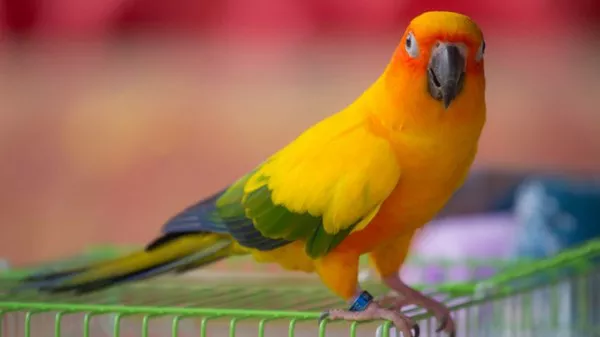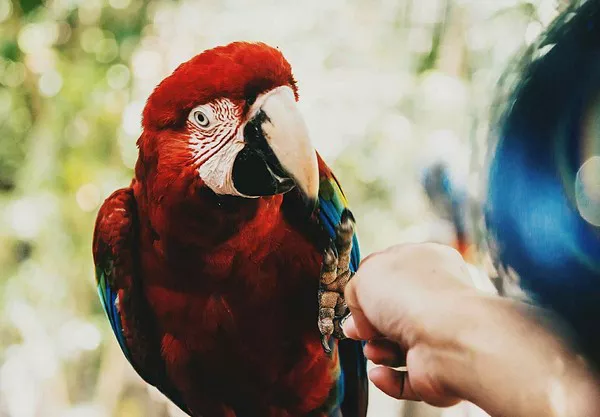Sun conures (Aratinga solstitialis) are among the most popular pet parrots due to their stunning colors and lively personalities. Their radiant plumage, which blends yellows, oranges, and greens, combined with their playful and affectionate demeanor, makes them a favorite among bird enthusiasts. However, like any pet, they come with their own set of challenges. It’s important to understand the disadvantages of sun conures to ensure that they are the right fit for you and your household.
In this article, we will explore the potential downsides of owning a sun conure in detail, helping prospective owners make an informed decision.
1. High Noise Levels
One of the most significant disadvantages of sun conures is their loud and frequent vocalizations. These birds are naturally social and use their calls to communicate with their flock, which, in captivity, often includes their human family.
Characteristics of Their Noise:
Volume: Sun conures are known for their piercing calls, which can reach up to 120 decibels, similar to the sound level of a jet engine during takeoff.
Frequency: They are not just loud occasionally; they can vocalize multiple times throughout the day, especially during early mornings and evenings.
Reasons for Calling: Their calls may indicate excitement, fear, hunger, boredom, or simply a desire for attention.
Challenges for Owners:
Disturbance: Their noise can disturb neighbors, especially in apartment or condo living.
Stressful for Sensitive Ears: People sensitive to loud sounds may find it difficult to cope with their vocalizations.
Incompatibility with Quiet Households: If you prefer a peaceful home, a sun conure might not be suitable.
2. Demanding Social Needs
Sun conures are highly social birds that thrive on interaction. In the wild, they live in flocks, which fulfill their need for companionship. As pets, they depend on their owners to replace their flock.
Social Needs Include:
Daily Interaction: They require several hours of attention and interaction each day.
Affection: Sun conures love physical affection, such as being petted and cuddled.
Entertainment: They need regular mental stimulation, which can be provided through toys, games, and training sessions.
Potential Issues:
Time Commitment: If you work long hours or frequently travel, a sun conure might feel neglected, leading to behavioral problems.
Loneliness: A lack of interaction can lead to depression, self-mutilation, or feather plucking.
Attention-Seeking Behavior: Some sun conures become overly dependent on their owners, leading to excessive screaming when they feel ignored.
3. Destructive Chewing Habits
Like most parrots, sun conures have strong beaks designed for chewing and shredding. This natural behavior can become problematic in a home environment.
Chewing Behavior:
Furniture Damage: They may chew on wooden furniture, doors, or baseboards.
Household Hazards: Sun conures might gnaw on electrical wires, paint, or other dangerous materials.
Toy Destruction: They require a constant supply of safe toys to satisfy their chewing instincts.
Mitigation Requires:
Supervision: Always keeping an eye on them when they are out of their cage.
Bird-Proofing: Making your home safe for a free-flying bird can be time-consuming and expensive.
Expense: High-quality chewable toys need regular replacement, adding to the cost of care.
4. Messiness
Owning a sun conure means accepting a significant level of mess in your home. These birds are not known for being tidy, and their habits can create extra work for owners.
Common Sources of Mess:
Food Waste: They often throw food out of their dishes and scatter it around the cage and surrounding area.
Feather Dust: As part of their natural grooming, they produce feather dust, which can accumulate in your home.
Droppings: They defecate frequently, requiring regular cage cleaning.
Bathing Splashes: When they bathe, water can splash onto surrounding furniture and floors.
Challenges:
Increased Cleaning: Their messiness requires daily cleaning to maintain hygiene.
Allergy Concerns: The feather dust can trigger allergies in sensitive individuals.
Difficulty in Shared Spaces: Keeping shared spaces clean and odor-free can be challenging, especially if the cage is in a central area of the home.
5. Health Concerns and Veterinary Care
Sun conures are prone to certain health issues, and maintaining their well-being requires effort and vigilance.
Common Health Issues:
Nutritional Deficiencies: They require a balanced diet of pellets, fresh fruits, vegetables, and occasional seeds. A poor diet can lead to deficiencies and illness.
Respiratory Problems: Their sensitive respiratory systems make them vulnerable to fumes, smoke, and other airborne pollutants.
Feather Plucking: Stress, boredom, or medical issues can lead to self-mutilation.
Psittacine Beak and Feather Disease (PBFD): A potentially fatal viral disease common in parrots.
Veterinary Challenges:
Specialized Care: Finding an avian veterinarian can be difficult in some areas.
Cost: Routine checkups and emergency care can be expensive.
Prevention: Owners need to maintain a clean and safe environment to minimize health risks.
6. Long Lifespan
Sun conures have an average lifespan of 20–30 years in captivity, which is both a blessing and a challenge.
Implications of Longevity:
Long-Term Commitment: Owning a sun conure is a multi-decade responsibility that can outlast major life changes, such as career shifts or moving homes.
Rehoming Concerns: Many parrots end up in rescue centers because their owners underestimated the commitment involved.
Emotional Attachment: These birds bond deeply with their owners, making rehoming emotionally challenging for both the bird and the owner.
7. Expensive Setup and Maintenance
The initial and ongoing costs of owning a sun conure can be significant.
Initial Costs:
Cage: A spacious, high-quality cage with suitable dimensions (at least 24x24x30 inches) can be expensive.
Accessories: Perches, toys, food bowls, and climbing structures are necessary additions.
Diet: A healthy diet that includes pellets, fresh produce, and occasional treats adds to the cost.
Ongoing Expenses:
Veterinary Bills: Routine and emergency care can be costly.
Toy Replacement: Regularly replacing chewed-up toys to keep the bird entertained.
Time and Effort: The time spent cleaning, feeding, and interacting also represents a form of investment.
8. Behavioral Challenges
Sun conures are intelligent birds, but their cleverness can sometimes lead to undesirable behaviors.
Behavioral Traits:
Biting: They can bite if they feel threatened, frustrated, or are improperly handled.
Territoriality: Some sun conures become protective of their cage or favorite person.
Mood Swings: Hormonal changes, particularly during breeding season, can make them more irritable.
Managing Behavior:
Training: Positive reinforcement training can mitigate some issues but requires time and consistency.
Patience: Behavioral problems may take months or even years to fully resolve.
Handling: Inexperienced owners may struggle with understanding and addressing their behavior.
9. Limited Compatibility with Other Pets
Sun conures may not get along with other pets, especially predatory animals like cats or dogs.
Risks with Other Pets:
Aggression: They might exhibit aggressive behavior toward smaller birds or unfamiliar animals.
Prey Instincts: Cats and dogs may see them as prey, leading to dangerous situations.
Supervision Needed: Any interactions with other pets must be closely monitored to prevent harm.
Conclusion
Sun conures are undeniably beautiful and charismatic birds, but they are not the right pet for everyone. Their high noise levels, demanding social needs, and potential for destructive behavior are just some of the challenges associated with their care. Additionally, their long lifespan, health requirements, and the costs involved demand significant commitment and resources.
Before bringing a sun conure into your home, it’s crucial to weigh these disadvantages against their positive traits. While they can be wonderful companions for the right owner, they require a level of dedication and understanding that not everyone is prepared for. By carefully considering their needs, you can make an informed decision that ensures both you and your feathered friend enjoy a happy, fulfilling life together.
Related Topics:
























